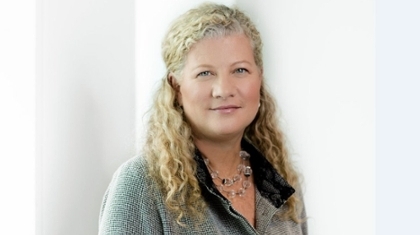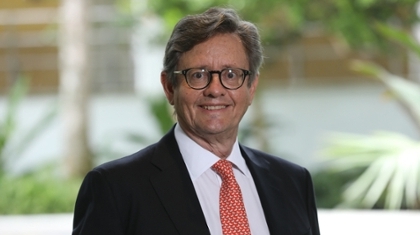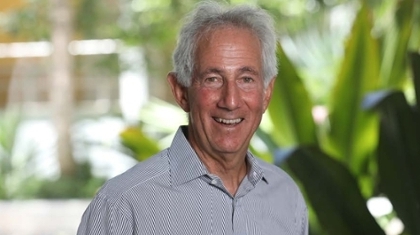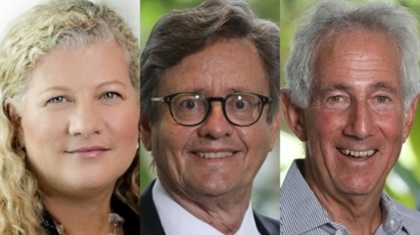Miami Business School is pleased to announce the second semester of its Executives-in-Residence program.
This initiative, which began Fall 2018, is a way to bring industry expertise into the classroom setting.
“Executives-in-Residence provide the highest caliber of thought leadership from the very pinnacles of industry and commerce. Their insights, connectivity, and understanding of how cutting-edge academics thought leadership meets practice drives forward the faculty’s research and translates into a richer, more authentic, cutting-edge classroom experience for students,” said Business Technology Department Chair and Associate Professor Robert Plant.
The program began with three expert executives: Kimberly Hammonds (former Group Chief Operating Officer, Deutsche Bank AG), Paulo Leme (Chairman, Vinland Capital, and former CEO and Chairman, Goldman Sachs do Brasil Banco Múltiplo S.A.), and Rick Toren (serial entrepreneur in health care).
Each executive brings their individual experiences and tailors their expertise to what they want to incorporate into the program.
“The E-I-Rs will bring in decades worth of industry experience to share with our students. Specifically, they will coach them to prepare for job interviews and nurture their leadership skills. They provide a bridge between academics and the world of practice,” said Vice Dean for Faculty and Research Henrik Cronqvist.
“Miami is a city that attracts a wealth of accomplished business professionals, who may step down from intense corporate careers to devote more time to MBS and our students,” he said.
“Essentially, the capacity of the dearth of success in Miami, (composed of) mostly retirees, is unprecedented, and we aim to include the subject matter expertise into our U, in order to augment the University faculty excellence,” said Director of Entrepreneurship Michael Wilson.
Kim Hammonds
Former Group Chief Operating Officer, Deutsche Bank AG

Kimberly L. Hammonds most recently served as the Group Chief Operating Officer at Deutsche Bank AG. During her tenure, she was the third female in the history of the company to serve on the management board.
As an executive-in-residence, Hammonds wants to execute a mentorship program with the purpose of building a runway for quant students, especially females.
“(I want) to help women progress in a leadership capacity, technology roles, and mentor, guide, and ultimately help young women get jobs,” said Hammonds.
There are three areas that Hammonds wants to focus on during her tenure at the University of Miami Business School:
- Mentoring/career coaching large group of students
- Implementing a high-potential technology program
- Implementing a technology executive program
Hammonds recognizes the importance of having good mentors.
“(It’s important to) have a group of mentors who believe in you, when you don’t believe in yourself,” said Hammonds.
By creating opportunities, Hammonds hopes to “not only help students gain access and provide networking exposure to big name companies, but to more importantly help the students land internships and jobs within these companies.”
“It’s important to be fearless, but to also have a high-degree of humility. It’s important to work hard every single day,” said Hammonds.
Paulo Leme
Chairman, Vinland Capital
Former CEO and Chairman, Goldman Sachs do Brasil Banco Múltiplo S.A

Paulo Leme wants to bring the topics that are not read in textbooks into the classroom.
“I want to share my knowledge. I want to be able to bring real-life experiences to students, turn on a light, and get them really motivated,” said Leme.
Leme currently serves as chairman at Vinland Capital and is the former CEO and chairman of Goldman Sachs do Brasil Banco Múltiplo S.A.
Leme hopes to connect all of the business students, undergraduate, MBA, and Masters, within the industry, but with a twist.
“There is a place for everyone,” said Leme. “What makes an institution successful is diversity. I want to bring that message to the students.”
Leme is very happy to have been given this opportunity by Dean John Quelch, Vice Dean for Faculty and Research Henrik Cronqvist, and Finance Department Chair and Professor Alok Kumar.
Leme likes to take on change and faces challenges head on. He is excited to be a part of this new challenge.
“Risk is your friend. Normally, people think that it is bad. Risk is an opportunity. My advice to students is that they take as many risks as they possibly can take. The learning process is about taking risks. People aren’t used to taking risks,” said Leme. “We are given a false sense that life should be predictable; it is, until it’s not.”
Rick Toren
Serial Entrepreneur in Health Care

Rick Toren’s entrepreneurial journey began early on, when he first started a business mowing yards as a teenager. When he went to college, his entrepreneurial spirit continued.
At first, he first took a job in college repairing pinball machines, but then, he soon realized that he could create his own business by going to the bank and cashing people’s checks for them.
“That’s how serial entrepreneurs happen: One thing leads to another. You don’t really sit in your desk and say, ‘alright, what am I going to do now?’ I’ve never had that happen. I’ve never had to go out and think of the new idea. It’s almost like the problem hits you in the face, and you’ve got to fix it,” said Toren.
After college, his brother encouraged him to meet one of his colleagues, who was a cardiologist that worked for the U.S. Department of Defense. The cardiologist needed help developing a mechanism containing an antidote to nerve gas for soldiers to use quickly in the field, if it was emitted.
This auto-injection device, known as AtroPen, went on to be redesigned by Toren, and is more commonly used and known today as the EpiPen, which treats individuals who are having a life-threatening allergic reaction.
Not only did Toren make his mark in the health care industry with these life-changing devices, he also developed the holter cassette recorder, used for patients who are complaining of heart palpitations, as well as the AstroPen, which NASA used to treat motion sickness, bradycardia, and arrhythmia in space.
From there, Toren continued his entrepreneurial efforts and created businesses, such as Promedco, Inc., a start-up that focused on managing physician practices, and CodeRyte, a computer-assisted coding web application for medical coding, which he sold to 3M in 2012 for $150 million.
“Entrepreneurship: valleys and peaks. When you start, they’re closer together, and then they spread out, and they’re not as steep, but they’re still there. In every company. That’s the way it is. You just have to be able to go with it and say, ‘I’m going to continue on because it’s a problem, it has to get solved.’ Someone’s going to solve it, and if you can’t, nobody can. You’ve got to push yourself,” said Toren.

